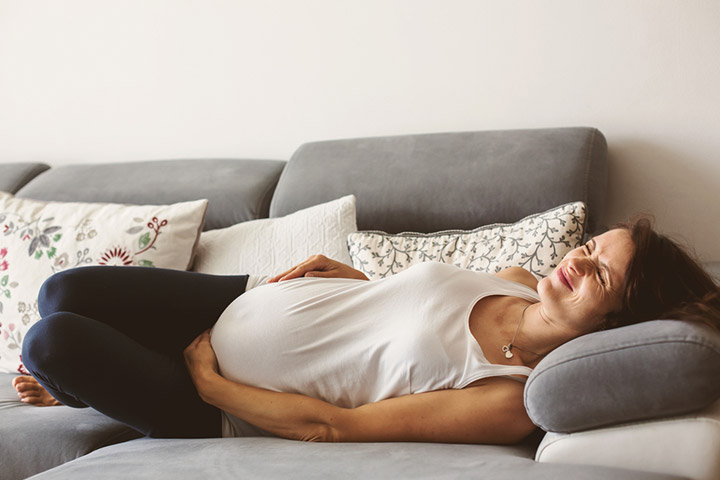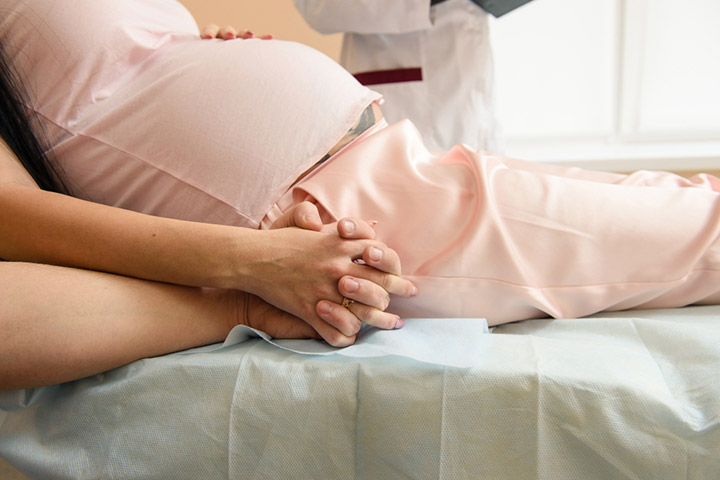
Image: Shutterstock
Pregnancy can be a magical time where you learn to have a new appreciation for your body. Not only are you growing a human being inside your body, but you are also dealing with other not so fun factors that come along with it like swollen feet, varicose veins, chest burns and back pain. And just when you thought there’s nothing else to anticipate, you start feeling odd contractions much before your delivery date! Does this mean that the baby has arrived early? Not necessarily. What you really might be feeling are Braxton Hicks contractions. If you’d like to know about these types of contractions and what they mean for you and your baby then this is the article for you. Keep on reading!
What Are Braxton Hicks Contractions?
If you feel like you’re experiencing some tightness in your abdomen all of a sudden, you might be having Braxton Hicks contractions. These contractions are also popularly called ‘false’ or ‘practice’ contractions because even though they do a good job at mimicking what is to come, they don’t signal that you are in labor. In fact, Braxton Hicks contractions can come and go throughout your entire pregnancy, starting from your first trimester. How cool is that! The real function of these contractions is to prepare your body for labor by slowly toning the muscles in your uterus. However, keep in mind that they are not a sign that the labor is beginning nor do they cause labor.
If you’re well into your pregnancy and are experiencing contractions close to your due date, it’s best to contact your doctor or midwife in order to confirm if they are simply Braxton Hicks contractions or labor contractions. Braxton Hicks contractions can start from the first trimester of your pregnancy but you may not feel them until your second trimester. They are mostly felt in the third trimester, especially as you approach your due date. These contractions come irregularly and usually last for 30 seconds. However, this can extend to up to 2 minutes per contraction. However, they are not painful, although they can be quite uncomfortable.
How Are Braxton Hicks Contractions Different From Labor Contractions?
There are a few things to consider before you start to panic and think you are experiencing labor contractions instead of Braxton Hicks contractions. These are the same differences that your doctor or midwife will consider when assessing if you’re in labor.
1. Cervix
Bracton Hicks contractions do not induce labor as they don’t perform the function of dilating or opening the cervix. However, labor contractions will ensure that the cervix is dilated and that it has started to open in order for the baby to make its way out of the vaginal canal.
2. Duration Of Contractions
Labour contractions usually come in regular intervals and last from anywhere between 30 to 70 seconds. Whereas, Braxton Hicks contractions are extremely irregular throughout your pregnancy and only last for about 30 seconds.
3. Pain
The good thing about Braxton Hicks contractions is that, although you may feel them at random times throughout your term, they are not painful. At most, they can be uncomfortable and may apply some slight pressure or stretchy feeling to your abdomen. Whereas, actual labor contractions, as we all know, can be quite painful and require all of your attention to deal with.
Another big factor to consider is how easy it is to alleviate the pain and discomfort you feel. If you are experiencing Braxton Hicks contractions, doing a simple activity like going on a walk or even switching to another position can help stop the contraction. You could also try taking a warm shower or bath to help your body relax. But walking around may only worsen labor contractions and make them stronger.
How Can You Ease The Discomfort?
It is important to remember that Braxton Hicks contractions are normal and do not require medical attention or treatment. But if you feel uncomfortable and need some relief there are a few things that you can try. For instance, simply lying down or changing your position can do the trick. You can also go on a nice slow walk. If you’re feeling exhausted and want to stay at home, try taking a bath or a quick shower to relax your body. You can also have a massage. And don’t forget to stay hydrated and urinate when you need to. This will take some of the pressure off of your abdomen.
Recognising when you have Braxton Hicks contractions and managing them isn’t as hard as it may seem. Once you notice them and learn to alleviate them, they will hardly ever cross your mind!
Sources
- Braxton Hicks Contractions, NCBI
- Physiology, Pregnancy Contractions, NCBI
- Stages of Labor, NCBI
















